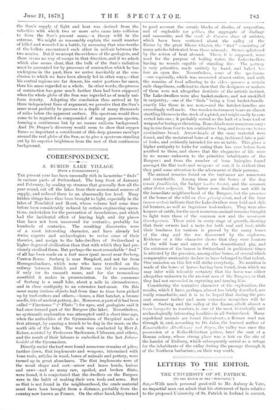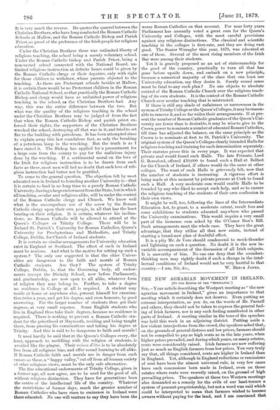LETTERS TO THE EDITOR.
THE UNIVERSITY OF ST. PATRICK.
[TO TOR EDITOR OF THE "SPECTATOR:1
Sin,—With much personal good-will to Mr. Aubrey de Vere, no impartial man can admit that his statement of facts relative to the proposed University of St. Patrick in Ireland is correct. It is very much the reverse. He quotes the quarrel between the Christian Brothers, who have long conducted the Roman Catholic Schools at Mallow, and the Roman Catholic Bishop and Parish Priest, as proof of the preference of the Irish people for religions education.
Under the Christian Brothers there was unlimited liberty of religions teaching, the school being a merely voluntary school.
Under the Roman Catholic bishop and Parish Priest, being a non-vested school connected with the National Board, un- limited religious instruction at definite hours could be given by the Roman Catholic clergy or their deputies, only with right for those children to withdraw, whose parents objected to the teaching. As there are Protestant schools besides at Mallow, it is certain there would be no Protestant children in the Roman Catholic National School, so that practically the Roman Catholic Bishop and clergy would have as unlimited power of religious teaching in the school, as the Christian Brothers had. Any way, this was the entire difference between the two. But what was the quality of the religious teaching in the school under the Christian Brothers may be judged of from the fact that when the Roman Catholic Bishop and parish priest en- forced their rights, the supporters of the Christian Brothers wrecked the school, destroying all that was in it, and tried to set fire to the building with petroleum. It has been attempted since to explain away this last scandalous fact, as only the breaking of a petroleum lamp in the wrecking. But the truth is as I have stated it. The Bishop has applied for a presentment for a large sum from the county to pay for the malicious injury done by the wrecking. If a sentimental moral on the love of the Irish for religious instruction is to be drawn from such facts as these, most men will feel no doubt that such love of reli- gious instruction had better not be gratified.
To come to the general question. The objection felt by most educated men in Ireland to founding another University is—that it is certain to lead in no long time to a purely Roman Catholic University, having a large endowment from the State, but in which all teaching, secular and religious alike, will be under the control of the Roman Catholic clergy and Church. We know well what is the unscrupulous use of the screw by the Roman Catholic clergy upon their own people, in all that has the least bearing on their religion. It is certain, whatever his inclina- tions, no Roman Catholic will be allowed to attend at the Queen's Colleges or Trinity College. There will be in Ireland St. Patrick's University for Roman Catholics, Queen's University for Presbyterians and Methodists, and Trinity College, Dublin, for Church of Ireland students.
It is certain no similar arrangements for University education exist in England or Scotland. The effect of such in Ireland must be noxious. And what is the motive for setting up such a system ? The only one suggested is that the older Univer- sities are dangerous to the faith and morals of Roman Catholic students. Are they ? The system of Trinity College, Dublin, is, that the Governing body, all endow- ments (except the Divinity School, now before Parliament), and graduateship, are now open to all alike, whatever form of religion they may belong to. Further, to take a degree no residence in College at all is required. A student may reside at home or anywhere else, present himself for examina- tion twice a year, and get his degree, and even honours, by good answering. Far the larger number of students thus get their degrees, at very small expense. Some English students who live in England thus take their degrees, because no residence is required. There is nothing to prevent a Roman Catholic stu- dent for the priesthood at Maynooth, residing and being taught there, from passing his examinations and taking his degree at Trinity. And this is said to be dangerous to faith and morals !
It need hardly be said that at the Queen's Colleges every, the least, approach to meddling with the religion of students, is avoided like the plague. Their raison d'are is to be absolutely free from all religious bias, and offer sound learning to all alike. If Roman Catholic faith and morals are in danger from such causes as these, a " happy valley," cut off from all human society of other religious views, must be the only safe alternative.
The fine educational endowments of Trinity College, given in a former age, all now agree, are to be used for the good of all, without religious distinction. They have for generations been the centre of the intellectual life of the country. Whatever the restrictions of former days, much the greater number of Boman Catholics who have risen to eminence in Ireland were there educated. No one will venture to say they have been the worse Roman Catholics on that account. For near forty years Parliament has annually voted a great sum for the Queen's University and Colleges, with the most careful provisions against any religious distinctions. The classical and scientific teaching in the colleges is first-rate, and they are doing vast good. The Senior Wrangler this year, 1879, was educated at one of them. Several of the most rising members of the Irish Bar were among their students.
Yet it is gravely proposed as an act of statesmanship for the good of the country, practically to turn all that has gone before upside down, and embark on a new principle,.
because a numerical majority of the class that can least use University education, say they desire it. Surely sound sense must be fatal to any such plan ? No one objects to absolute control of the Roman Catholic Church over the religious teach- ing of its own students. It is the control of the Roman Catholic Church over secular teaching that is mistrusted.
If there is still any shade of unfairness or narrowness in the system of Trinity College or the Queen's Colleges, it may be reason- able to remove it, and so far widen their arrangements. If at pre- sent the number of Roman Catholic graduates of the Queen's Uni- versity are fewer than is desirable, it may be wise to give to the Crown power to nominate a number of educated Roman Catholics, till time has adjusted the balance, on the same principle as the Crown is to nominate at first to St. Patrick's University. The original system of the Queen's Colleges clearly intended Halls for religious teaching and training for each denomination separately.. Their statutes prove this in every page. It was expected that private zeal would found such Halls. The late Primate, Lord G. Beresford, offered £10,000 to found such a Hall at Belfast for the Church of Ireland, if others would do the same at other colleges. The want of such Halls is grievously felt, now that the number of students is increasing. A vigorous effort is being made at this moment by private persons at Cork to found such a Hall. A very moderate sum would enable Halls to be founded by any who- liked to accept such help, and so to ensure the religious teaching of the students of their own confession in their own views.
It might be well, too, following the lines of the Intermediate Education Act, to grant, to a moderate extent, result fees and some exhibitions to students educated anywhere who passed the University examinations. This would require a very small part of the immense sum asked by the O'Conor Don's Bill.. Such arrangements meet the whole case. They have the great advantage, that they utilise all that now exists, instead of starting a brand-new plan of doubtful effect.
It is a pity Mr. de Vere should condescend to mock-thunder- and lightning on such a question. No doubt it is the now in- variable accompaniment of the discussion of all Irish subjects._ It is unworthy of him. No one can deny that the soundest- thinking men may rightly doubt if such a change in the intel- lectual conditions of Ireland would not be very hurtful to that



































 Previous page
Previous page